+86-18927501869
- All
- Product Name
- Product Keyword
- Product Model
- Product Summary
- Product Description
- Multi Field Search
 English
EnglishViews: 254 Author: Allen YI Publish Time: 2023-09-27 Origin: Site
In various industrial settings, from factories to automotive workshops, maintaining cleanliness isn't just about aesthetics. It's fundamentally a matter of safety. Whether it's to prevent the spread of contaminants, to ensure products are manufactured to the highest standards, or to protect the health of workers, cleanliness is paramount. And at the heart of this is hand cleanliness.
Hands, given their constant interaction with different materials, machines, and products, are frequent carriers of dirt, grease, and other contaminants. In an industrial environment, this dirt isn't just the usual everyday grime we're familiar with. It can often be stubborn residues, chemical substances, or oils that are hard to clean with ordinary soap and water.
Heavy duty wipes are specially formulated cleaning products. They are thicker, more absorbent, and often infused with powerful cleaning agents that can tackle tough stains and contaminants without being harsh on the skin. They are the go-to for tasks that need a stronger cleaning approach.
Industrial hand wipes, on the other hand (pun intended), are specifically designed for the unique challenges of industrial settings. They not only clean but also often contain moisturizing agents to prevent hands from drying out, given the frequent cleaning required. These wipes are durable, effective, and a staple in many industries where quick and efficient hand cleaning is needed.
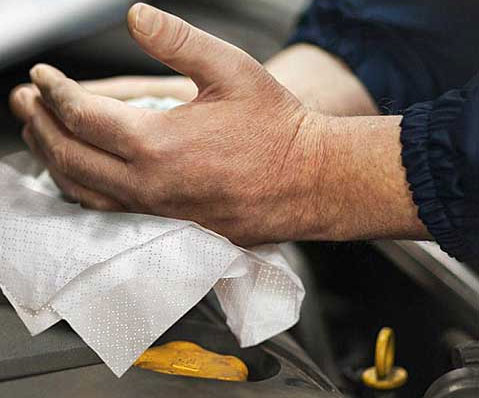
In the realm of industry, cleanliness, and precision often go hand-in-hand. While most are familiar with household wipes used for basic cleaning tasks, industrial wipes serve more specialized and critical roles. Let's delve into their common uses and how they differentiate from the regular wipes we're accustomed to.
1. Manufacturing: Industrial tough plus wipes are essential for cleaning machinery and surfaces to prevent contamination, especially in sectors where purity is paramount, such as pharmaceutical or food production.
2. Automotive: Mechanics and technicians use these cleaning wipes to remove grease, oil, and other stubborn substances from parts, tools, and their hands.
3. Electronics: Ensuring electronic components are free from dust and contaminants is crucial. Lint-free industrial wipes help achieve this without leaving residues.
4. Healthcare: While not a replacement for sterilization processes, these wipes aid in cleaning medical tools and surfaces, ensuring an environment with reduced risk of cross-contamination.
5. Construction: On construction sites, wipes help clean tools, surfaces, and workers' hands from adhesives, paints, and other substances.
● Strength and Durability: Industrial wipes are generally thicker and more robust, designed to handle tougher stains and chemicals without tearing.
● Chemical Formulation: Unlike regular wipes, which might contain mild cleansing agents, industrial cleaning wipes are often infused with stronger solvents or specialized compounds to tackle stubborn industrial contaminants.
● Packaging: While many household wipes come in small, portable packs for convenience, industrial wipes might be packaged in bulk or in specialized containers to dispense them more efficiently in a high-use environment.
● Safety and Compatibility: Industrial wipes are formulated to be used on specific materials or in certain environments, ensuring they don't corrode surfaces or cause unwanted reactions.
In essence, while both types of wipes aim to clean, the context of their use and the challenges they're designed to address are what set them apart. Industrial wipes cater to specialized needs, ensuring that industries function smoothly, efficiently, and safely.
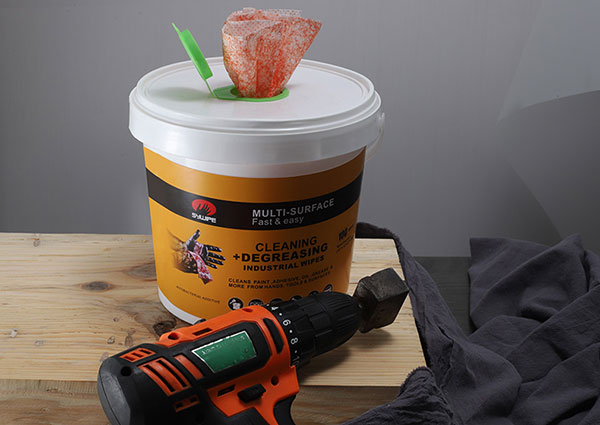
Industrial cleaning wipes are a staple in numerous sectors, offering robust cleaning solutions to challenges that regular wipes might falter against. Let's take a more in-depth look at their definition, key characteristics, and the typical ingredients that give them their powerful cleaning capabilities.
● Definition: Industrial cleaning wipes are specialized cleaning aids designed for use in industrial and professional environments. Unlike their household counterparts, these wet wipes are formulated to handle tougher contaminants, from oils and greases to adhesives and chemicals.
● Durability: One of the standout features of industrial wipes is their resilience. They're often thicker and more robust, allowing them to endure rigorous cleaning tasks without easily tearing or disintegrating.
● High Absorbency: These wipes are crafted to absorb larger quantities of liquids, making them ideal for spills of industrial products or chemicals.
● Low Lint Production: Especially crucial in sectors like electronics or aerospace, industrial wipes are designed to produce minimal lint, ensuring no residues are left behind that could compromise machinery or delicate components.
● Solvents: These help dissolve stubborn substances like grease, oils, and paints. Examples might include isopropanol or ethyl acetate.
● Surfactants: These reduce the surface tension of a liquid, allowing the wipe to lift and remove dirt more efficiently.
● Emulsifiers: Useful for ensuring that oils and water-based contaminants can be lifted off a surface together.
● Moisturizers: Given the frequent hand-cleaning required in industrial settings, some wipes contain moisturizing agents to prevent skin from drying out.
● Antimicrobial Agents: These are especially common in wipes used in healthcare or food production environments, killing or inhibiting the growth of bacteria and other pathogens.
● pH Adjusters: These ensure that the wipes maintain a skin-friendly pH level, especially important if they're frequently used for hand cleaning.
The essence of industrial cleaning wipes lies in their specialized formulation and design. Crafted to cater to the unique challenges of industrial settings, they ensure cleanliness, efficiency, and safety in various professional environments.
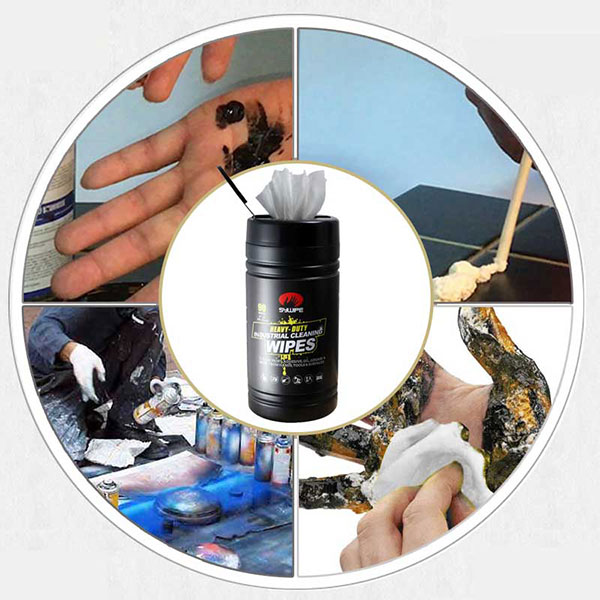
In industrial environments where dirt, grease, and grime are common encounters, the need for effective cleaning solutions is paramount. Among these solutions, heavy-duty industrial hand wipes have carved a niche for themselves, proving to be indispensable. Let's explore why one might opt for these over regular wipes and understand their salient features and benefits.
● Strength: Regular cleaning wet wipes, designed for household spills and light cleaning, can easily tear when faced with tough stains or substances. In contrast, heavy-duty industrial hand wipes are built to be more robust and durable, capable of handling demanding cleaning tasks.
● Efficiency in Cleaning: While regular wet wipes can handle everyday dirt and grime, industrial hand wipes are formulated to tackle more challenging contaminants commonly found in industrial settings, like oils, greases, and adhesives.
● Safety: Regular wipes might not be safe for all surfaces or materials, especially those found in industrial environments. Heavy-duty wipes are often designed with specific industries in mind, ensuring compatibility with equipment, tools, and materials.
● Volume and Size: Industrial wipes typically come in larger sizes and are more saturated, providing extended cleaning capability per wipe, which is crucial for larger machinery or dirtier tasks.
● Superior Cleaning Agents: Heavy-duty wipes contain solvents and agents formulated to break down stubborn industrial contaminants.
● Moisture Retention: They have a prolonged wetness compared to regular wipes, allowing them to remain moist for extended periods, ensuring effective cleaning over a more extended period.
● Skin-Friendly: Despite their strong cleaning power, many industrial wipes also contain skin conditioners or moisturizers to prevent hands from drying or chafing after frequent use.
● Environmentally Conscious Options: Recognizing the need for sustainable solutions, many brands now offer biodegradable or eco-friendly heavy-duty wipes, minimizing environmental impact.
● Portability: Despite their heavy-duty nature, these wipes often come in portable containers or packs, making them convenient for on-the-go tasks or mobile workstations.
● Multi-surface Compatibility: Heavy-duty wipes can often be safely used on multiple surfaces, from metals to plastics, without causing damage or leaving residues.
In sum, heavy-duty industrial hand wipes are not just a more potent version of household wipes. They are a distinct category, meticulously designed to address the unique challenges posed by industrial environments. Their superior cleaning power, combined with user-friendly features, makes them an essential tool in various industries.
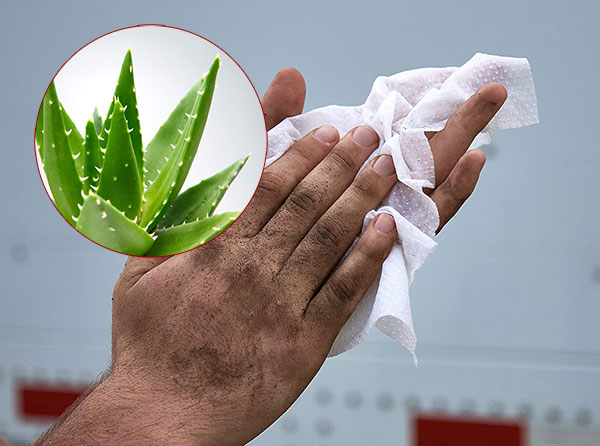
Heavy-duty industrial hand wipes have been designed to provide maximum efficiency in industrial settings. However, their efficacy is dependent not just on their formulation, but also on how they're used. Here's a step-by-step guide to ensure you get the most out of these powerful cleaning aids.
Before using the wipe, visually inspect your hands and remove any large pieces of debris, particles, or residues. This not only prolongs the life of the wipe but also prevents potential scratches or harm to the skin.
Open the packaging and pull out a single wipe. Ensure the pack is resealed after extraction to prevent the remaining wipes from drying out. If the wipes come in a tub or a dispenser, make sure the lid is securely closed after use.
Begin by unfolding the wipe if necessary. Use both hands to hold the wipe, ensuring a good grip. Wipe in a gentle yet firm manner, applying adequate pressure to remove stubborn stains or residues. Avoid using excessive force as this might cause the wipe to tear or could lead to skin abrasion.
Pay special attention to areas that are often overlooked, such as between the fingers, the back of the hands, and the wrists. Ensure every part is cleaned, especially when working with harmful or hazardous substances.
If a single wipe becomes too dirty or saturated, it's advisable to dispose of it and use a new one to continue cleaning. Always use as many wipes as necessary to ensure your hands are thoroughly cleaned.
Once you've finished cleaning, ensure the used wipes are disposed of properly, considering the nature of the contaminants they hold. It's also a good idea to wash your hands with water and soap after using the wipes, especially if you’ve been in contact with harmful substances. If the wipes contain strong solvents or chemicals, consider using a moisturizing hand lotion to replenish the skin's natural oils.
While the primary function of industrial hand wipes is, as the name suggests, to clean hands, their utility doesn't stop there. The strong formulation and durable construction make these wipes a versatile tool, suitable for a range of cleaning applications across different scenarios.
● Tool Cleaning: Industrial hand wipes can be used to clean tools, ensuring they are free from oils, greases, and other residues. This not only prolongs the lifespan of tools but also ensures they function optimally.
● Surface Cleaning: In a manufacturing or workshop environment, keeping surfaces clean is paramount. These tough plus wipes can be used to clean workbenches, machinery surfaces, and countertops, ensuring a contaminant-free work environment.
● Equipment Maintenance: For sensitive equipment, especially in sectors like electronics, using industrial wipes can ensure components are free from dust and other particles, thus ensuring the longevity and efficiency of the equipment.
● Spill Response: Quick response to spills, especially of chemicals or industrial products, is crucial. Industrial hand wipes can be used for immediate cleanup, preventing potential hazards.
● Cleaning Vehicle Interiors: In industries where vehicles, such as trucks or forklifts, are frequently used, the interiors can accumulate dirt and grime. Industrial wipes can be used for quick and effective cleaning.
● Safety First: Before using industrial hand wipes on any surface or equipment, ensure they are compatible to prevent damage or unwanted reactions.
● Proper Technique: When cleaning surfaces or tools, ensure you're wiping in a direction that pushes the contaminants away from the clean area. Fold the wipe as you go, so you're always using a clean section.
● Regular Checks: For sensitive equipment, especially electronics, regularly inspect the components after cleaning to ensure no residues or fibers are left behind.
● Proper Disposal: After use, especially when dealing with hazardous substances, ensure the used wipes are disposed of in appropriate waste bins. Some industrial settings might have specific disposal requirements for contaminated materials.
● Follow-up Cleaning: In some scenarios, using a wipe might be the first step in a cleaning process. After wiping away the majority of contaminants, a more thorough cleaning method might be necessary.
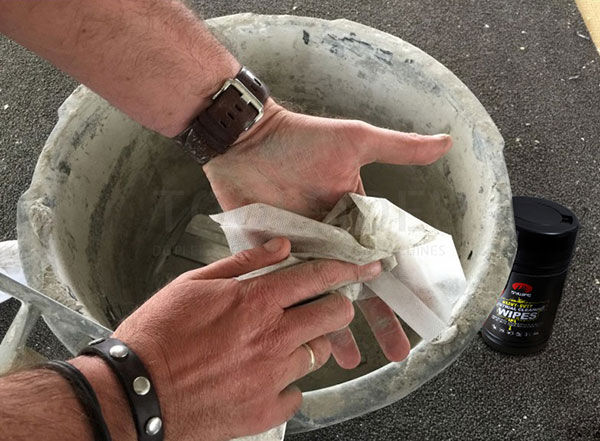
The market for industrial hand wipes is vast, catering to an array of needs across different sectors. With numerous brands and product variations available, making an informed choice is essential. Here's a guide to help you navigate this landscape and choose the right heavy-duty industrial hand wipes for your needs.
● List of Ingredients: Always check the ingredients. Look for effective solvents or cleaning agents that target specific contaminants commonly encountered in your industry. Avoid wipes that contain harmful or irritating chemicals, especially if they will be used frequently.
● Strength and Durability: The wipe's material should be robust and thick enough to handle tough cleaning without tearing easily.
● Moisture Content: Wipes should be sufficiently moist to clean effectively but not overly saturated to the point of dripping.
● Low Lint: Especially important for industries like electronics or precision engineering where residues can compromise equipment or processes.
● Skin-Friendly Formulations: If wipes are frequently used for hand cleaning, they should contain skin-friendly ingredients or moisturizers to prevent skin from drying out.
● Packaging: Consider packaging that is both convenient for your workspace and helps keep the wipes moist over time.
● Eco-Friendly Options: If sustainability is a concern, look for wipes that are biodegradable or brands that adopt eco-friendly manufacturing processes.
(Note: I'll provide general advice as my training data only goes up to September 2023, and I won't have the most up-to-date brand recommendations.)
● Research Online: Websites, industry forums, and reviews can provide insights into the most reputable brands.
● Industry Standards: Some industries have specific brands that are preferred due to their performance, safety, or other industry-specific reasons.
● Wholesalers and Distributors: Purchasing from specialized wholesalers or distributors often provides a broader selection and possibly better prices for bulk purchases.
● Local Retailers: Depending on your location, hardware stores or industrial supply shops may stock popular brands of industrial hand wipes.
● Direct from Manufacturer: Some brands may offer direct purchasing options, especially for bulk orders.
● Trade Shows or Industry Events: These events can be an excellent opportunity to see new products, get samples, and speak directly with manufacturers or distributors.
When choosing a brand or place to buy, also consider factors like shipping costs, return policies, and customer service. Remember, the cheapest option might not always be the best in terms of quality, so prioritize your specific needs and the wipes' effectiveness over cost alone.

The use of heavy-duty industrial hand wipes, while providing numerous benefits in terms of cleaning and efficiency, also comes with responsibilities. These wipes often come into contact with industrial contaminants, and their disposal requires careful consideration. Moreover, the environmental impact of such products is becoming an increasingly important concern. Here’s a guide to addressing these aspects.
● Evaluate Contaminants: If the wipes have been used with hazardous or toxic substances, they may need to be treated as hazardous waste. Familiarize yourself with local regulations regarding the disposal of such waste.
● Specialized Bins: In some industrial settings, it's advisable to have designated bins for used wipes, especially if they're contaminated with specific chemicals or substances.
● Avoid Flushing: Never flush industrial wipes down the toilet, even if they're labeled as "flushable." They can cause blockages and aren't designed to break down like toilet paper.
● Incineration: Some facilities might opt for incinerating heavily contaminated wipes, transforming them into ash, water vapor, and carbon dioxide.
● Sealable Bags: If the wipes are heavily soiled or saturated with chemicals, placing them in sealable bags before disposing of them can help contain the contaminants.
Recycling: While rare, some types of industrial wipes can be cleaned and recycled. Check with your provider or local regulations.
● Reduced Environmental Impact: Eco-friendly wipes are often biodegradable, meaning they'll break down over time, reducing landfill waste.
● Sustainable Materials: Many green products use sustainably sourced materials, ensuring that their production doesn't harm the environment or deplete resources.
● Safer Ingredients: Eco-friendly wipes often use cleaning agents that are less harmful to the environment and can reduce water contamination.
● Lower Carbon Footprint: Some manufacturers take into account the entire lifecycle of the product, aiming to reduce its carbon footprint from production to disposal.
● Corporate Responsibility: Supporting brands that prioritize environmental considerations can push the industry towards more sustainable practices. It also bolsters a company's image as being environmentally conscious.
● Economic Benefits: In the long run, eco-friendly practices can lead to savings. For instance, reduced waste can mean reduced disposal costs.
In conclusion, while the primary function of industrial hand wipes is to ensure cleanliness and efficiency, considering their environmental and safety impacts is crucial. Proper disposal practices safeguard the environment and workers, while choosing eco-friendly products paves the way for a sustainable future in industry.
Throughout the bustling environments of industries, from the cacophonous machinery of manufacturing units to the precision-laden chambers of electronics labs, cleanliness stands as an unsung pillar of efficiency and safety. In this context, the role of heavy-duty industrial hand wipes emerges not just as a convenience but as a necessity.
The distinct advantages of these wipes are manifold. They're specifically formulated to tackle the stubborn residues and contaminants typical in industrial settings, where ordinary wipes would falter. Their strength and resilience ensure that they can stand up to rigorous tasks without prematurely tearing or losing efficacy. Moreover, their versatility extends their utility beyond just cleaning hands, making them an indispensable tool across various scenarios in professional environments.
However, as with all tools, their true potential is harnessed only when used correctly. Proper usage ensures maximum efficiency, safety for the user, and longevity for the associated equipment or machinery. Furthermore, in an era that's increasingly conscious of environmental impact, selecting the right kind of wipes and disposing of them responsibly is a duty we owe to our planet.
Sywipe seizes every opportunity to use high-quality resources, including peer-reviewed research, to support the facts in our article. Learn more about our factory and how to keep the content accurate, reliable, and trustworthy.
1.《Why Industrial Wipes are Crucial for Cleaning Dirty Hands in Industrial Settings?》
2. 《How to Choose Industrial Cleaning Wet Wipes?》
3. 《How to Easily Remove Acrylic Paint with Industrial Cleaning Wipes?》
Our Customers Always Come First
Trust is the Foundation of Our Service
sales@clean-wipe.com
sywipe@clean-wipe.com
Room 4611, No. 372 Huanshi East Road, Yuexiu District, Guangzhou,China.
+86-18927501869 / +86-20-81608597
/ +86-18927501869